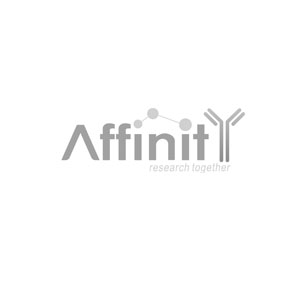ACVR1C Antibody - #DF6118
| Product: | ACVR1C Antibody |
| Catalog: | DF6118 |
| Description: | Rabbit polyclonal antibody to ACVR1C |
| Application: | WB IHC |
| Reactivity: | Human, Mouse, Rat |
| Prediction: | Pig, Zebrafish, Bovine, Horse, Sheep, Rabbit, Dog, Chicken |
| Mol.Wt.: | 55kDa; 55kD(Calculated). |
| Uniprot: | Q8NER5 |
| RRID: | AB_2838085 |
Related Downloads
Protocols
Product Info
*The optimal dilutions should be determined by the end user.
*Tips:
WB: For western blot detection of denatured protein samples. IHC: For immunohistochemical detection of paraffin sections (IHC-p) or frozen sections (IHC-f) of tissue samples. IF/ICC: For immunofluorescence detection of cell samples. ELISA(peptide): For ELISA detection of antigenic peptide.
Cite Format: Affinity Biosciences Cat# DF6118, RRID:AB_2838085.
Fold/Unfold
Activin A receptor, type IC; Activin receptor like kinase 7; Activin receptor type 1C precursor; Activin receptor type IC; Activin receptor type-1C; Activin receptor-like kinase 7; ACTR IC; ACTR-IC; ACTRIC; ACV1C_HUMAN; Acvr1c; ACVRLK7; ALK 7; ALK-7; ALK7;
Immunogens
Present in pancreas, heart, colon, small intestine, ovary and the hippocampus, medulla oblongata and putamen of the brain. Isoform 1, isoform 2, isoform 3 and isoform 4 are all expressed in the placenta throughout pregnancy.
- Q8NER5 ACV1C_HUMAN:
- Protein BLAST With
- NCBI/
- ExPASy/
- Uniprot
MTRALCSALRQALLLLAAAAELSPGLKCVCLLCDSSNFTCQTEGACWASVMLTNGKEQVIKSCVSLPELNAQVFCHSSNNVTKTECCFTDFCNNITLHLPTASPNAPKLGPMELAIIITVPVCLLSIAAMLTVWACQGRQCSYRKKKRPNVEEPLSECNLVNAGKTLKDLIYDVTASGSGSGLPLLVQRTIARTIVLQEIVGKGRFGEVWHGRWCGEDVAVKIFSSRDERSWFREAEIYQTVMLRHENILGFIAADNKDNGTWTQLWLVSEYHEQGSLYDYLNRNIVTVAGMIKLALSIASGLAHLHMEIVGTQGKPAIAHRDIKSKNILVKKCETCAIADLGLAVKHDSILNTIDIPQNPKVGTKRYMAPEMLDDTMNVNIFESFKRADIYSVGLVYWEIARRCSVGGIVEEYQLPYYDMVPSDPSIEEMRKVVCDQKFRPSIPNQWQSCEALRVMGRIMRECWYANGAARLTALRIKKTISQLCVKEDCKA
Predictions
Score>80(red) has high confidence and is suggested to be used for WB detection. *The prediction model is mainly based on the alignment of immunogen sequences, the results are for reference only, not as the basis of quality assurance.
High(score>80) Medium(80>score>50) Low(score<50) No confidence
PTMs - Q8NER5 As Substrate
| Site | PTM Type | Enzyme | Source |
|---|---|---|---|
| K147 | Acetylation | Uniprot | |
| K165 | Acetylation | Uniprot | |
| K168 | Acetylation | Uniprot | |
| K327 | Ubiquitination | Uniprot |
PTMs - Q8NER5 As Enzyme
Research Backgrounds
Serine/threonine protein kinase which forms a receptor complex on ligand binding. The receptor complex consisting of 2 type II and 2 type I transmembrane serine/threonine kinases. Type II receptors phosphorylate and activate type I receptors which autophosphorylate, then bind and activate SMAD transcriptional regulators, SMAD2 and SMAD3. Receptor for activin AB, activin B and NODAL. Plays a role in cell differentiation, growth arrest and apoptosis.
Membrane>Single-pass type I membrane protein.
Present in pancreas, heart, colon, small intestine, ovary and the hippocampus, medulla oblongata and putamen of the brain. Isoform 1, isoform 2, isoform 3 and isoform 4 are all expressed in the placenta throughout pregnancy.
Binds the type 2 receptor protein ACVR2A.
Belongs to the protein kinase superfamily. TKL Ser/Thr protein kinase family. TGFB receptor subfamily.
Research Fields
· Cellular Processes > Cellular community - eukaryotes > Signaling pathways regulating pluripotency of stem cells. (View pathway)
· Environmental Information Processing > Signal transduction > TGF-beta signaling pathway. (View pathway)
Restrictive clause
Affinity Biosciences tests all products strictly. Citations are provided as a resource for additional applications that have not been validated by Affinity Biosciences. Please choose the appropriate format for each application and consult Materials and Methods sections for additional details about the use of any product in these publications.
For Research Use Only.
Not for use in diagnostic or therapeutic procedures. Not for resale. Not for distribution without written consent. Affinity Biosciences will not be held responsible for patent infringement or other violations that may occur with the use of our products. Affinity Biosciences, Affinity Biosciences Logo and all other trademarks are the property of Affinity Biosciences LTD.
